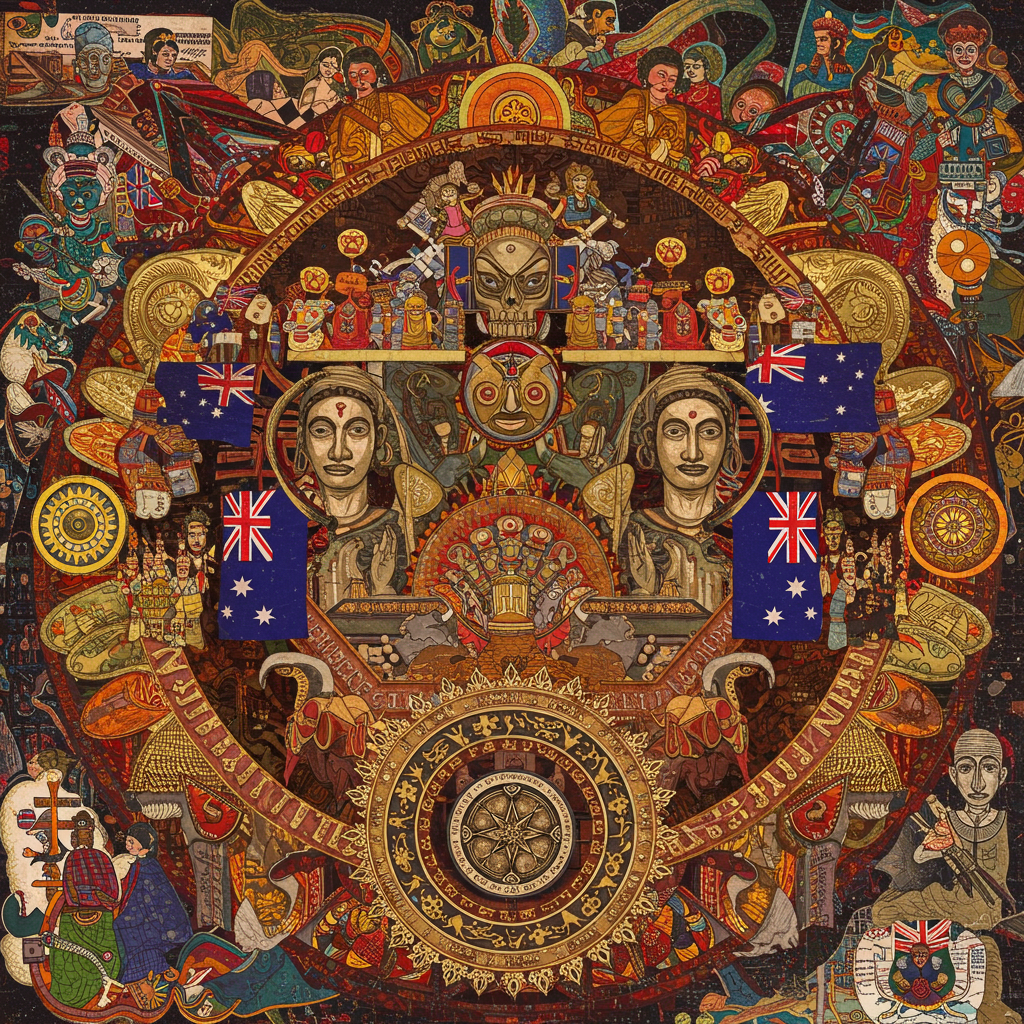Australia has announced its significant intention to formally recognize a Palestinian state at the upcoming United Nations General Assembly in September. This move, declared by Prime Minister Anthony Albanese, positions Australia among a growing number of nations, including the UK, France, and Canada, considering similar diplomatic shifts. This decision represents a pivotal moment in international efforts to foster peace in the Middle East, particularly amidst the devastating conflict in Gaza. It aims to revitalize the long-sought two-state solution, which many view as the only viable path to lasting stability and an end to the cycle of violence.
This strategic foreign policy shift reflects Australia’s commitment to finding a pathway to enduring peace and addressing the dire humanitarian situation in the region. The Australian government believes that recognizing Palestinian statehood is a crucial step towards creating momentum for a viable two-state future, rather than an outcome of a final peace settlement. This approach signals a departure from previous diplomatic conventions, emphasizing proactive engagement in shaping the future of the Israeli-Palestinian conflict.
A Historic Diplomatic Shift
Prime Minister Anthony Albanese articulated Australia’s rationale, stating that a “two-state solution is humanity’s best hope to break the cycle of violence in the Middle East.” He emphasized its potential to bring an end to the pervasive conflict, suffering, and starvation plaguing Gaza. The government’s decision comes after extensive discussions with international counterparts, including leaders from the UK, France, New Zealand, and Japan, suggesting a coordinated diplomatic effort to seize a “moment of opportunity.”
The Rationale Behind Australia’s Move
The Australian government’s stance underscores a belief that Israel’s current actions in Gaza are inadvertently “extinguishing the prospect of a two-state solution.” This recognition is framed not as a reward for any particular faction, but as a diplomatic “circuit-breaker” designed to isolate extremist groups like Hamas and create a framework for future Palestinian self-determination. Foreign Minister Penny Wong has reiterated that for Australia, recognizing Palestine has been “a matter of when, not if” for over a year, highlighting a carefully considered and evolving policy.
Key Commitments from the Palestinian Authority
Australia’s decision is underpinned by specific, detailed commitments received from the Palestinian Authority (PA). These include:
Demilitarisation: A pledge from the PA to demilitarise any future Palestinian state.
Elections: A commitment to hold general elections, a significant step given the PA has not held parliamentary elections since 2006.
Recognition of Israel: The PA’s reaffirmation of Israel’s right to exist in peace and security.
Hamas’s Exclusion: A crucial assurance from PA President Mahmoud Abbas that Hamas would play no role in any future Palestinian state.
These conditions aim to ensure that Palestinian self-determination proceeds in a manner that contributes to regional stability and fosters long-term peace. The PA views such recognition as a powerful affirmation of its people’s right to self-determination, aligned with international law.
Global Reactions and Regional Implications
The announcement has triggered a wide spectrum of international responses, reflecting the deep divisions surrounding the Israeli-Palestinian conflict. While many nations already recognize Palestine, Australia’s decision adds significant weight from a Western democracy.
Israel’s Strong Condemnation
Israeli Prime Minister Benjamin Netanyahu vehemently condemned Australia’s planned recognition of Palestinian statehood, asserting that it “rewards terrorism.” He labeled the move “disappointing” and “shameful,” questioning how Australia would react to a similar horrific attack near its major cities like Melbourne or Sydney. Israel’s Ambassador to Australia, Amir Maimon, echoed these sentiments, accusing the Albanese government of prioritizing symbolism over a genuine peace process and undermining Israel’s security.
The U.S. Stance and Concerns
The United States has firmly stated it will not follow Australia’s lead. U.S. Vice-President JD Vance reiterated the belief that recognizing Palestinian statehood at this juncture would be seen as rewarding Hamas. Concerns also center on the perceived lack of a functional or unified government within the Palestinian Authority, which the U.S. sees as a prerequisite for effective statehood. This divergence highlights a key challenge in international efforts to forge a unified approach to the conflict.
International Alignment and Precedent
Australia’s move aligns with accelerating actions by key allies. The UK, Canada, and France are also reportedly preparing for similar recognition. This trend follows previous formal recognitions by Spain, Ireland, and Norway last year, who acted with the express hope of encouraging a ceasefire between Hamas and Israel. Globally, 147 of the UN’s 193 member states, or approximately three-quarters, already recognize Palestinian statehood. Palestine currently holds “permanent observer state” status at the UN, allowing participation but no voting rights. This growing international consensus puts increasing pressure on nations that have historically withheld recognition.
The Broader Context: Gaza’s Humanitarian Crisis
The backdrop to Australia’s decision is the ongoing, devastating conflict in Gaza, which has created an unprecedented humanitarian catastrophe. The severity of the situation underscores the urgency of diplomatic intervention.
Unfolding Catastrophe in Gaza
Israel launched its military campaign in Gaza in response to the Hamas-led attacks of October 7, 2023, which resulted in the deaths of approximately 1,200 people and the taking of 251 hostages. Since then, the Hamas-run health ministry reports over 61,000 deaths in Gaza. Tragically, starvation and malnutrition have claimed at least 217 lives, including five recent fatalities. The dire situation, particularly with Israel’s plans to take over Gaza City, continues to draw international condemnation and calls for an end to the conflict.
Calls for Peace and Accountability
The international community, including UN ambassadors, has condemned the severity of the conflict and the humanitarian toll. There are widespread calls for a permanent ceasefire, unimpeded humanitarian aid, and an end to Israeli military operations and occupation. Some voices within Australia, including Labor MPs and Greens senators, have even suggested imposing increased sanctions on Israel and ceasing military trade, citing the need for greater accountability for the conduct of the war and the alleged targeting of journalists.
Australian Political Landscape and Public Sentiment
The Australian government’s announcement has ignited a robust debate across the country’s political spectrum, reflecting diverse perspectives on the conflict and Australia’s role.
Diverse Views Within Australia
Proponents within the Labor Party, like Senator Fatima Payman, expressed excitement, viewing the decision as aligning Australia with “the right side of history.” Multicultural Affairs Minister Anne Aly emphasized Australia’s sovereignty in making the decision, noting that over 100 countries already recognize Palestine. Labor Friends of Palestine hailed it as a “significant step” but urged further diplomatic action, including a permanent ceasefire and an end to military trade.
However, the Coalition opposition, represented by Senator Jane Hume and Shadow Foreign Affairs Minister Michaelia Cash, voiced “serious concerns.” They argued the move risks “rewarding bad behaviour” and questioned the Palestinian Authority’s capacity for reform, citing its 17-year election drought. Cash warned it could embolden Hamas. Independent Senator Jacqui Lambie, while critical of Israel’s actions, questioned if recognition genuinely helps starving children. Greens Senator David Shoebridge, while welcoming the overdue recognition, stated it “does not meet the moment” without “material action” such as sanctions on Israel and halting F-35 component supplies.
Public Demonstrations
The decision also comes amid significant public pressure. Recently, a pro-Palestinian protest drew tens of thousands of supporters who marched across Sydney Harbour Bridge, underscoring strong public sentiment in Australia regarding the conflict.
Future Pathways and Challenges
Australia’s commitment to recognizing a Palestinian state is not merely a symbolic gesture; it signals a desire to play an active role in shaping the region’s future.
The Role of Reconstruction and Aid
Beyond recognition, Australia intends to contribute significantly to the post-war reconstruction of Gaza. Discussions are reportedly “advanced” with international counterparts, with hopes of engaging the United States in these talks. Australia is exploring its potential role in rebuilding Gaza’s civilian infrastructure, including bureaucracy and healthcare, drawing parallels to its involvement in East Timor’s rebuilding efforts. This commitment highlights a tangible aspect of Australia’s broader engagement strategy, aiming to alleviate suffering and lay the groundwork for a functioning Palestinian state.
Navigating Complex Diplomatic Terrain
The path forward is fraught with challenges. The conditions placed on the Palestinian Authority, such as holding elections and demilitarisation, will require careful monitoring. Questions remain about what Australia would do if these commitments are not met. Furthermore, maintaining dialogue with all relevant parties, including Israel and the US, while navigating differing diplomatic positions, will be crucial. This complex diplomatic terrain underscores the careful balancing act Australia must perform to ensure its actions genuinely contribute to peace and stability in the Middle East.
Frequently Asked Questions
Why is Australia recognising a Palestinian state now?
Australia’s decision to recognize a Palestinian state in September stems from a belief that a “two-state solution is humanity’s best hope” to end the ongoing violence and suffering in the Middle East, particularly in Gaza. Prime Minister Anthony Albanese indicated it’s a strategic move to create momentum for peace and isolate groups like Hamas. This shift comes amid increasing international pressure on Israel regarding the humanitarian crisis in Gaza and follows similar considerations by allies like the UK, France, and Canada, reflecting a changing global diplomatic landscape.
What does “recognising a Palestinian state” actually mean internationally?
Recognizing a Palestinian state means Australia will formally acknowledge Palestine as a sovereign entity with defined borders and a functioning government, similar to how it recognizes other countries. For Palestine, which is currently recognized by 147 out of 193 UN member states and holds “permanent observer state” status at the UN, this step strengthens its international legitimacy and its claim to self-determination. It aims to empower the Palestinian Authority and provide a diplomatic pathway for future negotiations towards a lasting two-state solution.
What are the main criticisms and concerns about Australia’s decision?
Critics, primarily Israel and the Australian opposition, argue that recognizing Palestine at this time “rewards terrorism” following the October 7 Hamas attacks and undermines efforts to secure the release of hostages. They also express skepticism about the Palestinian Authority’s ability to reform and govern effectively, citing its long history without elections. Concerns include the potential for the decision to embolden Hamas or to put Australia at odds with its key ally, the United States, which does not plan to recognize Palestinian statehood.
Conclusion: A Step Towards Enduring Peace?
Australia’s decision to recognize a Palestinian state marks a significant and proactive shift in its foreign policy. Driven by a commitment to the two-state solution and a desire to alleviate suffering in Gaza, this move positions Australia as an active participant in global efforts to foster Middle East peace. While met with strong reactions and significant challenges, particularly from Israel and the U.S., it aligns Australia with a growing international consensus. The success of this diplomatic step will ultimately depend on the Palestinian Authority’s adherence to its commitments, ongoing international cooperation, and a genuine commitment from all parties to de-escalation and a negotiated future. This is a bold gamble for peace, aiming to break the cycle of violence and create a tangible path towards two states living side-by-side in security.




